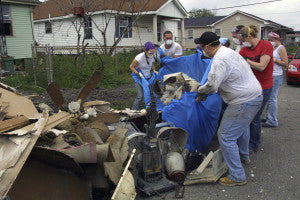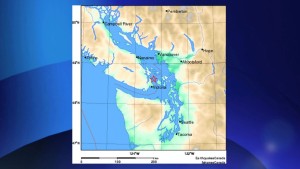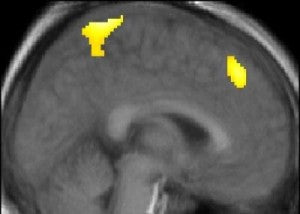[caption id="attachment_19848" align="alignright" width="300"]

Seeing the effects of Hurricane Katrina helped many people start preparing for emergencies.[/caption]
For Shelly Robertson, of American Fork, Utah, seeing people on TV during Hurricane Katrina’s aftermath caused her to begin preparing an emergency kit. For Tina Koeven, from Pleasant Grove, Utah, a practice earthquake evacuation taught her she needed to make an emergency kit portable. For people in Victoria, British Columbia, Canada, a mild earthquake December 29 prompted enough demand for emergency kits that one store temporarily sold out.
All these people learned to be prepared from their experiences.
“To be effective learners we must (1) perceive information, (2) reflect on how it will impact some aspect of our life, (3) compare how it fits into our own experiences, and (4) think about how this information offers new ways for us to act,”
wrote Marcia L. Conner, who trains organizations about how to help their employees be effective
[caption id="attachment_19847" align="alignright" width="300"]

The 4.3 magnitude earthquake in BC reminded folks how close they are to impending disaster. - via CityNews[/caption]
Let’s use her model of learning to break down the case of the British Columbia earthquake as a wake-up call. The earthquake was moderate:
Natural Resources Canada measured it at 4.3 and there were no injuries or damage. One man said it felt like a truck passing by. It took place late at night about 20 kilometers (12 miles) north of the city of Victoria, just over the northern border of Washington State.
So, some people in British Columbia perceived information: there was an earthquake. They reflected about how it would impact them: What damage could a large earthquake cause? They compared how it fit into their experiences: they might need to leave their homes or be without resources. And they thought about how to act: We might need an emergency kit.
The result: a British Columbia emergency preparedness company, 72 Hours, had to backorder personal emergency kits because so many people bought them,
reported CTV News, a Canadian TV news network.
"We hear people say they've been meaning to get prepared and they've procrastinated, and this was the wake-up call," 72 Hours employee Brian Fong told CTV.
Tina Koeven had a wake-up call from a mistake. Her church held an earthquake drill. Congregation members pretended an earthquake hit and evacuated to the church building with their emergency supplies. Koeven, who lives next door to the building, had her emergency kit in a large duffel bag.
“By the time I’d dragged the bag to the church … I wanted to lay down and die because I couldn’t go anywhere else,” she said. “Or be like the [early American] pioneers and throw stuff out along the trail.”
She’s considering other ways to carry her emergency kit.
It’s possible to learn from others’ mistakes too. In fact, a brain imaging study published in 2010 in the
online journal NeourImage suggested it might be more effective.
[caption id="attachment_19849" align="alignright" width="300"]

Our neural activity tends to be stimulated by our competitor's errors (as in the example shown here) rather than their successes. Credit: Dr. Paul Howard-Jones and Dr. Rafal Bogacz[/caption]
Researchers had study subjects play a simple game. They found that when a player’s computer opponent was taking a turn, the player’s own brain was activated as if they were performing the action. The study found players’ brains were more active when their opponent made a mistake.
“This suggests that we benefit from our competitors' failures by learning to inhibit the actions that lead to them,” the study authors said.
Shelly Robertson decided to build an emergency kit after seeing TV accounts of people stranded during the aftermath of Hurricane Katrina. A cascade of mistakes kept them from getting assistance for days.
“There wasn’t any way to get people help, and we live in the U.S.,” she said. “It really unnerved me.”
She built an emergency kit containing things like food, emergency blankets, cooking and heating gear, and a radio. She also included candy and toys for her children.
“You don’t want to just survive,” she said. “You’ve got to give them something to do while you wait for help to arrive.”
--Melissa
What events have given you a wake-up call to start preparing for emergencies? Let us know in the comments!
Source:
Marcia L. Conner, "Learning from Experience." Ageless Learner, 1997-2007.
http://agelesslearner.com/intros/experiential.html
 a Rafflecopter giveaway
a Rafflecopter giveaway
 Seeing the effects of Hurricane Katrina helped many people start preparing for emergencies.[/caption]
For Shelly Robertson, of American Fork, Utah, seeing people on TV during Hurricane Katrina’s aftermath caused her to begin preparing an emergency kit. For Tina Koeven, from Pleasant Grove, Utah, a practice earthquake evacuation taught her she needed to make an emergency kit portable. For people in Victoria, British Columbia, Canada, a mild earthquake December 29 prompted enough demand for emergency kits that one store temporarily sold out.
All these people learned to be prepared from their experiences.
“To be effective learners we must (1) perceive information, (2) reflect on how it will impact some aspect of our life, (3) compare how it fits into our own experiences, and (4) think about how this information offers new ways for us to act,” wrote Marcia L. Conner, who trains organizations about how to help their employees be effective
[caption id="attachment_19847" align="alignright" width="300"]
Seeing the effects of Hurricane Katrina helped many people start preparing for emergencies.[/caption]
For Shelly Robertson, of American Fork, Utah, seeing people on TV during Hurricane Katrina’s aftermath caused her to begin preparing an emergency kit. For Tina Koeven, from Pleasant Grove, Utah, a practice earthquake evacuation taught her she needed to make an emergency kit portable. For people in Victoria, British Columbia, Canada, a mild earthquake December 29 prompted enough demand for emergency kits that one store temporarily sold out.
All these people learned to be prepared from their experiences.
“To be effective learners we must (1) perceive information, (2) reflect on how it will impact some aspect of our life, (3) compare how it fits into our own experiences, and (4) think about how this information offers new ways for us to act,” wrote Marcia L. Conner, who trains organizations about how to help their employees be effective
[caption id="attachment_19847" align="alignright" width="300"] The 4.3 magnitude earthquake in BC reminded folks how close they are to impending disaster. - via CityNews[/caption]
Let’s use her model of learning to break down the case of the British Columbia earthquake as a wake-up call. The earthquake was moderate: Natural Resources Canada measured it at 4.3 and there were no injuries or damage. One man said it felt like a truck passing by. It took place late at night about 20 kilometers (12 miles) north of the city of Victoria, just over the northern border of Washington State.
So, some people in British Columbia perceived information: there was an earthquake. They reflected about how it would impact them: What damage could a large earthquake cause? They compared how it fit into their experiences: they might need to leave their homes or be without resources. And they thought about how to act: We might need an emergency kit.
The result: a British Columbia emergency preparedness company, 72 Hours, had to backorder personal emergency kits because so many people bought them, reported CTV News, a Canadian TV news network.
"We hear people say they've been meaning to get prepared and they've procrastinated, and this was the wake-up call," 72 Hours employee Brian Fong told CTV.
Tina Koeven had a wake-up call from a mistake. Her church held an earthquake drill. Congregation members pretended an earthquake hit and evacuated to the church building with their emergency supplies. Koeven, who lives next door to the building, had her emergency kit in a large duffel bag.
“By the time I’d dragged the bag to the church … I wanted to lay down and die because I couldn’t go anywhere else,” she said. “Or be like the [early American] pioneers and throw stuff out along the trail.”
She’s considering other ways to carry her emergency kit.
It’s possible to learn from others’ mistakes too. In fact, a brain imaging study published in 2010 in the online journal NeourImage suggested it might be more effective.
[caption id="attachment_19849" align="alignright" width="300"]
The 4.3 magnitude earthquake in BC reminded folks how close they are to impending disaster. - via CityNews[/caption]
Let’s use her model of learning to break down the case of the British Columbia earthquake as a wake-up call. The earthquake was moderate: Natural Resources Canada measured it at 4.3 and there were no injuries or damage. One man said it felt like a truck passing by. It took place late at night about 20 kilometers (12 miles) north of the city of Victoria, just over the northern border of Washington State.
So, some people in British Columbia perceived information: there was an earthquake. They reflected about how it would impact them: What damage could a large earthquake cause? They compared how it fit into their experiences: they might need to leave their homes or be without resources. And they thought about how to act: We might need an emergency kit.
The result: a British Columbia emergency preparedness company, 72 Hours, had to backorder personal emergency kits because so many people bought them, reported CTV News, a Canadian TV news network.
"We hear people say they've been meaning to get prepared and they've procrastinated, and this was the wake-up call," 72 Hours employee Brian Fong told CTV.
Tina Koeven had a wake-up call from a mistake. Her church held an earthquake drill. Congregation members pretended an earthquake hit and evacuated to the church building with their emergency supplies. Koeven, who lives next door to the building, had her emergency kit in a large duffel bag.
“By the time I’d dragged the bag to the church … I wanted to lay down and die because I couldn’t go anywhere else,” she said. “Or be like the [early American] pioneers and throw stuff out along the trail.”
She’s considering other ways to carry her emergency kit.
It’s possible to learn from others’ mistakes too. In fact, a brain imaging study published in 2010 in the online journal NeourImage suggested it might be more effective.
[caption id="attachment_19849" align="alignright" width="300"] Our neural activity tends to be stimulated by our competitor's errors (as in the example shown here) rather than their successes. Credit: Dr. Paul Howard-Jones and Dr. Rafal Bogacz[/caption]
Researchers had study subjects play a simple game. They found that when a player’s computer opponent was taking a turn, the player’s own brain was activated as if they were performing the action. The study found players’ brains were more active when their opponent made a mistake.
“This suggests that we benefit from our competitors' failures by learning to inhibit the actions that lead to them,” the study authors said.
Shelly Robertson decided to build an emergency kit after seeing TV accounts of people stranded during the aftermath of Hurricane Katrina. A cascade of mistakes kept them from getting assistance for days.
“There wasn’t any way to get people help, and we live in the U.S.,” she said. “It really unnerved me.”
She built an emergency kit containing things like food, emergency blankets, cooking and heating gear, and a radio. She also included candy and toys for her children.
“You don’t want to just survive,” she said. “You’ve got to give them something to do while you wait for help to arrive.”
--Melissa
What events have given you a wake-up call to start preparing for emergencies? Let us know in the comments!
Source:
Marcia L. Conner, "Learning from Experience." Ageless Learner, 1997-2007.
http://agelesslearner.com/intros/experiential.html
Our neural activity tends to be stimulated by our competitor's errors (as in the example shown here) rather than their successes. Credit: Dr. Paul Howard-Jones and Dr. Rafal Bogacz[/caption]
Researchers had study subjects play a simple game. They found that when a player’s computer opponent was taking a turn, the player’s own brain was activated as if they were performing the action. The study found players’ brains were more active when their opponent made a mistake.
“This suggests that we benefit from our competitors' failures by learning to inhibit the actions that lead to them,” the study authors said.
Shelly Robertson decided to build an emergency kit after seeing TV accounts of people stranded during the aftermath of Hurricane Katrina. A cascade of mistakes kept them from getting assistance for days.
“There wasn’t any way to get people help, and we live in the U.S.,” she said. “It really unnerved me.”
She built an emergency kit containing things like food, emergency blankets, cooking and heating gear, and a radio. She also included candy and toys for her children.
“You don’t want to just survive,” she said. “You’ve got to give them something to do while you wait for help to arrive.”
--Melissa
What events have given you a wake-up call to start preparing for emergencies? Let us know in the comments!
Source:
Marcia L. Conner, "Learning from Experience." Ageless Learner, 1997-2007.
http://agelesslearner.com/intros/experiential.html
 a Rafflecopter giveaway
a Rafflecopter giveaway

